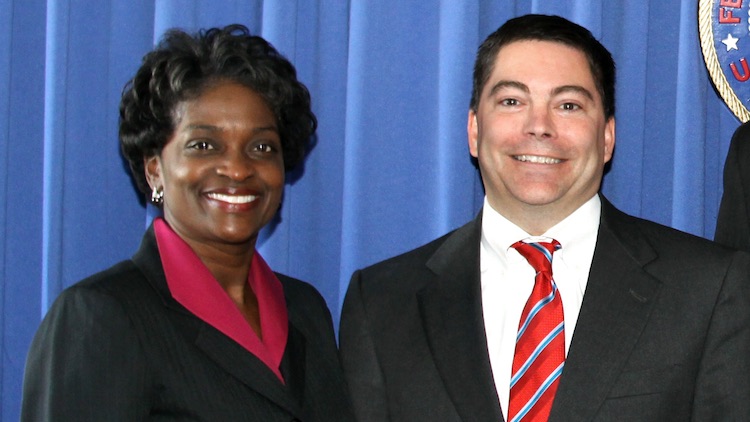FCC's O'Rielly, Clyburn Team on Informal USF Comment Request

The smarter way to stay on top of broadcasting and cable industry. Sign up below
You are now subscribed
Your newsletter sign-up was successful
In an unusual move, Republican FCC commissioner Michael O'Rielly and Democrat Mignon Clyburn have taken to the blogosphere together to issue an informal request for comment on means-testing high-cost broadband subsidies.
Formal requests for comment are driven by the chairman.
Both agree that the FCC should not be subsidizing people who don't deserve government assistance to reach those who do.
"We should end the practice of spending scarce USF [Universal Service Fund] high-cost support to illogically subsidize the cost of communications services for very rich people who happen to live in the more rural portions of our nation," they wrote.
The high-cost fund is for the hard to reach—mostly rural—areas of the country where there is the toughest business case for building out broadband on a purely marketplace basis.
They offered up a proposal to institute means-testing, saying it was meant to spark a conversation and that they also hope to be able to bring up the issue more formally—that would have to come from FCC chairman Ajit Pai—so as to "properly engage the entire American public."
They suggest that one way to means-test would be to set a threshold for adjusted gross income (AGI) above which households would not get the subsidy, then use a pretty hefty cut-off: "Would it be reasonable to select an AGI of $1 million or $500,000?," they ask, meaning that someone making $999,000 would still get the subsidy.
The smarter way to stay on top of broadcasting and cable industry. Sign up below
Among the questions they want input on:
"What are the advantages and disadvantages of using means-testing? Would it make the program more efficient as some commenters have suggested? Given our limited budget, would it enable the Commission and/or providers to retarget funding to areas or consumers in greater need of support? How can it be implemented without disruption to the current programs? Should it apply on a going- forward basis as rules for additional parts of the high-cost program, such as the Remote Areas Fund, are adopted? Could it eventually be implemented uniformly across all of the high-cost programs as they come up for renewal in the years to come, or would it need to be tailored to each program? How can it be structured to be effective and with sufficient accountability while imposing the fewest costs on providers and consumers? How should the Commission set income eligibility criteria? How should the Commission structure means-testing in a way that is administrable for the Commission, companies, and consumers? What data would the Commission need in order to effectively means-test the high-cost program?"
Contributing editor John Eggerton has been an editor and/or writer on media regulation, legislation and policy for over four decades, including covering the FCC, FTC, Congress, the major media trade associations, and the federal courts. In addition to Multichannel News and Broadcasting + Cable, his work has appeared in Radio World, TV Technology, TV Fax, This Week in Consumer Electronics, Variety and the Encyclopedia Britannica.

